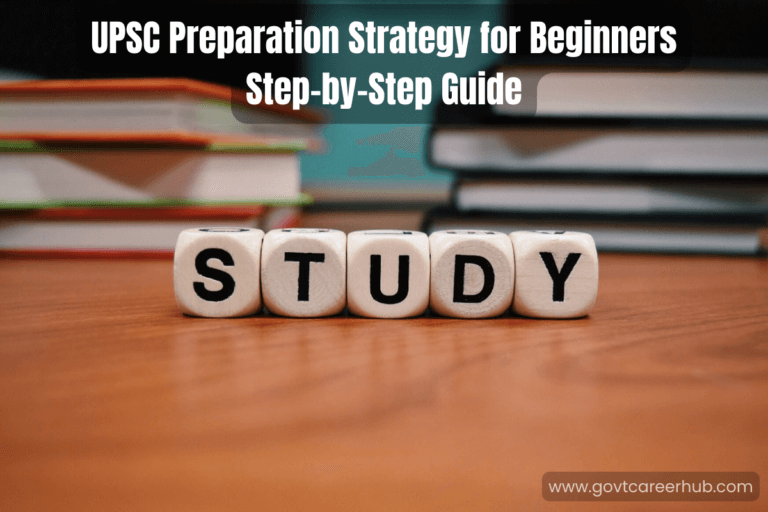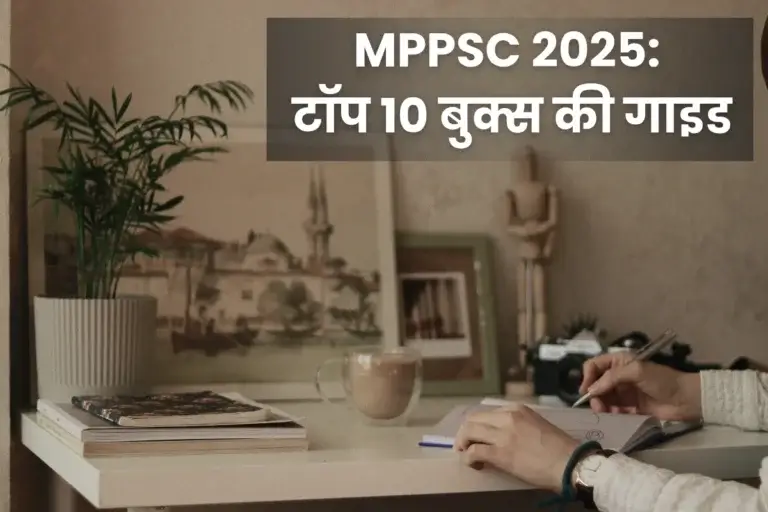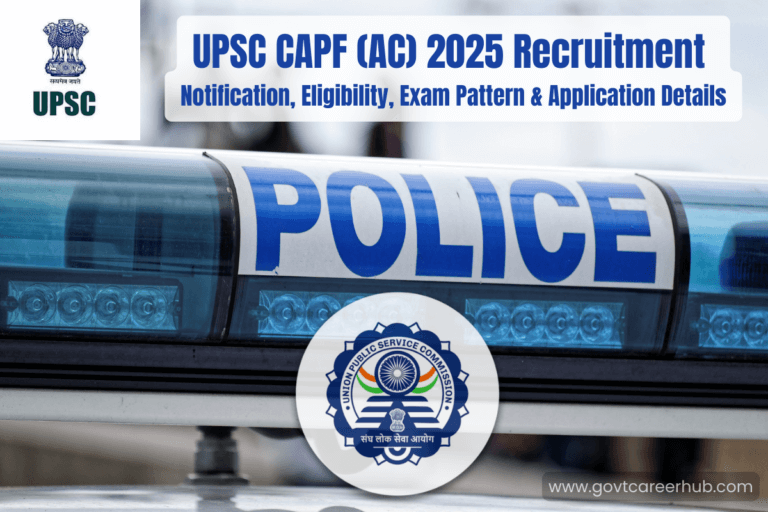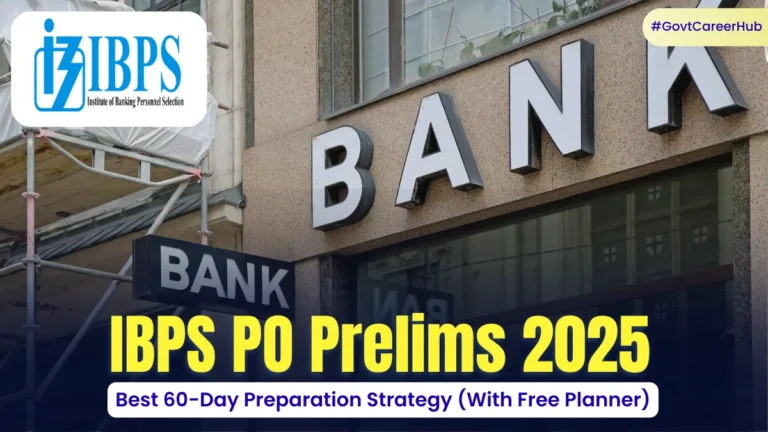UPSC Prelims 2025: The Ultimate Subject-Wise Study Plan That Actually Works for Beginners
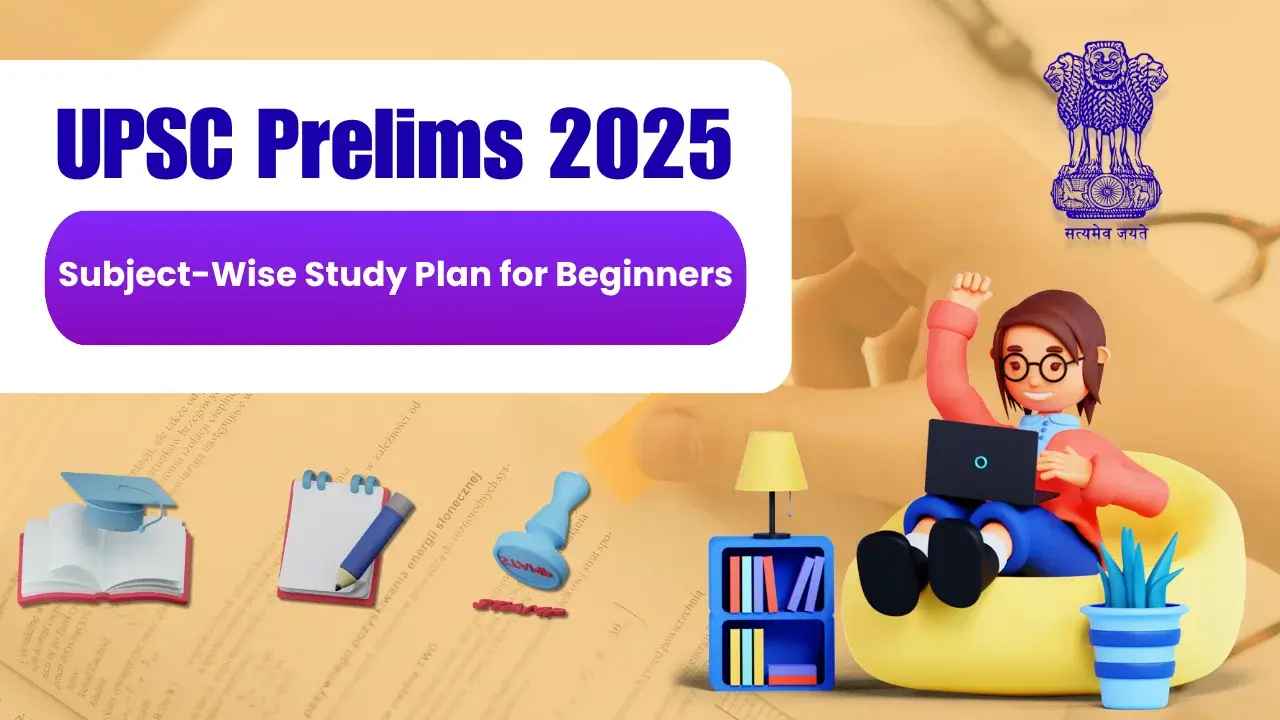
Last Updated: August 4, 2025 at 11:10 pm
UPSC 2025 Study Plan Overview
The UPSC 2025 study plan for beginners should span 12-18 months, dedicating 8-10 hours daily across 7 core subjects. Start with NCERT foundation (2-3 months), followed by standard reference books, current affairs, and practice tests. Allocate maximum time to General Studies Paper I (30%) and Current Affairs (25%).
Starting your UPSC journey can feel overwhelming, especially when you’re staring at the massive upsc prelims 2025 syllabus. But here’s the truth – thousands of beginners crack this exam every year by following a structured approach rather than random studying.
Whether you’re a 12th pass student, working professional, or career changer, this comprehensive guide provides a proven subject wise upsc study schedule that transforms overwhelming preparation into manageable daily tasks.
Understanding UPSC Prelims 2025: What You’re Up Against
The UPSC Civil Services Examination consists of three stages, with Prelims being your first gateway. The preliminary examination includes two compulsory papers:
- Paper I (General Studies): 200 marks, 2 hours
- Paper II (CSAT): 200 marks, 2 hours (qualifying nature – 33% marks required)
The upsc prelims 2025 syllabus covers seven major areas that require systematic preparation over 12-18 months.
Read Also: How to Start UPSC Preparation from Zero Level- The Best Guide
Complete Subject-Wise Breakdown for UPSC 2025
History and Culture (25% weightage)
Foundation Phase (2 months)
- Ancient India: NCERT Class 6-12
- Medieval India: Focus on major dynasties, cultural developments
- Modern India: Freedom struggle, socio-religious movements
Advanced Phase (1 month)
- Spectrum Modern History
- Indian Art and Culture by Nitin Singhania
Geography (20% weightage)
Physical Geography (1 month)
- NCERT Classes 6-12
- Certificate Physical Geography by G.C. Leong
Human and Economic Geography (1 month)
- Focus on India’s demographic patterns
- Economic geography through government resources
Polity and Governance (20% weightage)
Constitutional Framework (1.5 months)
- Indian Polity by M. Laxmikanth
- Recent constitutional amendments and judgments
Governance Issues (0.5 months)
- E-governance, transparency, accountability
- Government schemes and policies
Economics (15% weightage)
Basic Economics (1 month)
- NCERT Classes 9-12
- Economic Survey highlights
Current Economic Issues (1 month)
- Budget analysis, economic policies
- International economic relations
Environment and Ecology (10% weightage)**
Core Concepts (1 month)
- NCERT Environment books
- Current environmental issues and policies
- Climate change and biodiversity
Science and Technology (5% weightage)
Applied Science (0.5 months)
- Recent developments in biotechnology
- Space technology, defense technology
- Government S&T initiatives
Current Affairs (Year-round)
Daily Routine
- Newspaper reading (The Hindu/Indian Express)
- Monthly magazines (Yojana, Kurukshetra)
- Government portal updates
Read Also: Most Scoring Subjects in UPSC Prelims: How to Prioritize Syllabus for Maximum Success
Strategic Timeline: How to Start UPSC Preparation 2025
Phase-1: Foundation Building (Months 1-6)
Months-1-2: NCERT Foundation
- Complete NCERT books (Classes 6-12) for History, Geography, Polity, Economics
- Create subject-wise notes
- Focus on concept clarity over speed
Months-3-4: Standard Reference Books
- Begin Laxmikanth for Polity
- Spectrum for Modern History
- Start newspaper reading habit
Months-5-6: Integration Phase
- Connect current affairs with static portions
- Begin monthly revision cycles
- Start solving previous year questions
Phase-2: Intensive Preparation (Months 7-12)
Months-7-9: Advanced Study
- Complete all standard reference books
- Intensive current affairs compilation
- Join test series for practice
Months-10-12: Revision and Testing
- Multiple revision rounds
- Full-length mock tests
- Weak area identification and improvement
Phase-3: Final Sprint (Months 13-15)
Intensive Revision
- Daily mock tests
- Current affairs rapid revision
- Formula and fact memorization
Daily Study Schedule for UPSC Beginners
| Time Slot | Subject/Activity | Duration |
| 6:00-7:00 AM | Newspaper Reading | 1 hour |
| 7:00-9:00 AM | History/Culture | 2 hours |
| 10:00-12:00 PM | Geography | 2 hours |
| 1:00-3:00 PM | Polity | 2 hours |
| 4:00-5:30 PM | Economics | 1.5 hours |
| 6:00-7:00 PM | Environment/S&T | 1 hour |
| 8:00-9:00 PM | Current Affairs Compilation | 1 hour |
| 9:00-10:00 PM | Revision/Notes Making | 1 hour |
Weekly Schedule Breakdown:
- Monday-Tuesday: History and Polity focus
- Wednesday-Thursday: Geography and Economics
- Friday: Science, Technology, Environment
- Saturday: Current Affairs intensive
- Sunday: Revision and mock tests
Subject-Wise Time Allocation Table
| Subject | Daily Hours | Weekly Hours | Monthly Target |
| History & Culture | 2.5 | 17.5 | 70 hours |
| Geography | 2.0 | 14 | 56 hours |
| Polity & Governance | 2.0 | 14 | 56 hours |
| Economics | 1.5 | 10.5 | 42 hours |
| Environment & Ecology | 1.0 | 7 | 28 hours |
| Science & Technology | 0.5 | 3.5 | 14 hours |
| Current Affairs | 1.5 | 10.5 | 42 hours |
| Total | 11 hours | 77 hours | 308 hours |
Essential Resources for Each Subject
Core NCERT Books
- History: Classes 6-12 (Ancient, Medieval, Modern India)
- Geography: Classes 6-12 (Physical, Human, Economic)
- Polity: Classes 9-12 (Democratic Politics series)
- Economics: Classes 9-12 (Economic Development, Statistics)
- Science: Classes 6-10 (Foundation concepts)
Standard Reference Books
- History: Spectrum Modern History, India’s Ancient Past (R.S. Sharma)
- Geography: Certificate Physical Geography (G.C. Leong)
- Polity: Indian Polity (M. Laxmikanth)
- Economics: Indian Economy (Ramesh Singh)
- Environment: Environment by Shankar IAS Academy
Current Affairs Sources
- Daily: The Hindu, Indian Express
- Weekly: EPW (selected articles)
- Monthly: Yojana, Kurukshetra, PIB compilations
- Yearly: Economic Survey, India Year Book
Monthly Milestone Tracking
Month-1-2 Targets:
- Complete Ancient and Medieval India NCERTs
- Finish Geography NCERTs (Physical focus)
- Begin newspaper reading habit
Month-3-4 Targets:
- Complete Modern India and Polity NCERTs
- Start Laxmikanth (Constitutional framework)
- Begin Economics NCERTs
Month-5-6 Targets:
- Finish all NCERT coverage
- Complete 50% of Laxmikanth
- Start previous year question practice
Common Mistakes to Avoid
Over-Studying Syndrome Many beginners try to cover too many books. Stick to standard resources and focus on multiple revisions rather than extensive reading.
Ignoring Current Affairs Integration Don’t treat current affairs as separate from static portions. Always connect recent developments with your static knowledge.
Skipping Revision Cycles Plan for at least 3-4 complete revision rounds. First-time reading is just 30% of your preparation.
Neglecting Answer Writing Practice Start practicing 150-200 word answers from month 3. This builds the foundation for Mains preparation.
Technology Integration in Your Study Plan
Digital Tools for Enhanced Learning:
- Use apps like Anki for spaced repetition of facts
- Google Calendar for strict schedule adherence
- Notion or OneNote for organized digital notes
- YouTube channels for concept clarity (Unacademy, BYJU’S)
Online vs Offline Balance: Maintain 70% offline study (books, newspapers) and 30% online (current affairs, mock tests, video lectures for difficult concepts).
Motivation and Mental Health Management
Weekly Motivation Boosters:
- Set weekly achievable targets rather than monthly ambitious goals
- Celebrate small victories (completing a book, scoring well in mock tests)
- Connect with fellow aspirants for peer learning
Stress Management Techniques:
- Maintain 6-7 hours of quality sleep
- Include 30 minutes of physical activity daily
- Practice meditation or mindfulness for 15 minutes
- Take one complete day off every two weeks
Frequently Asked Questions (FAQs)
Transform Your UPSC Dreams into Reality Today
Your UPSC 2025 journey starts with the first page you read today. This daily plan for upsc beginners isn’t just another study schedule – it’s your roadmap to joining the ranks of successful civil servants who once stood exactly where you stand now.
Remember, every IAS officer was once a beginner who decided to take the first step. Your consistency over the next 12-18 months will determine whether you’re reading success stories or writing your own.
Ready to begin your transformation? Start with Day 1 of this study plan tomorrow morning. Your future self will thank you for the decision you make today.
Read Also: Can You Crack UPSC Without Coaching? Success Stories & Tips


